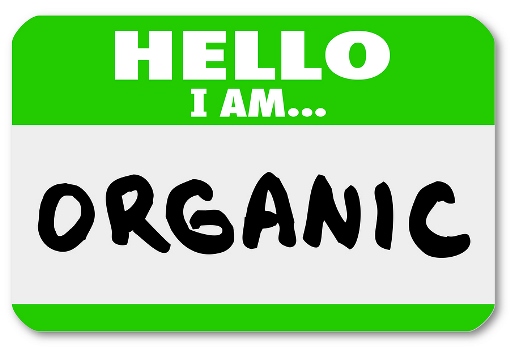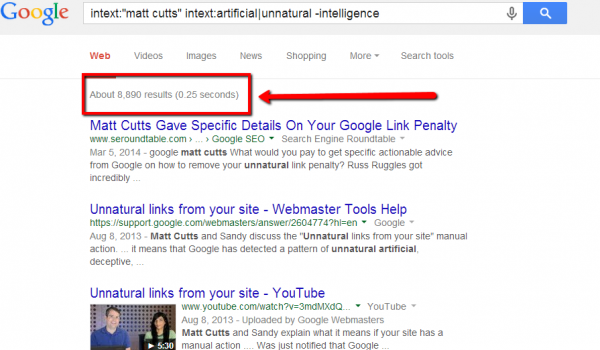 And Do You Really Want a Truly Natural Search World? Really?
And Do You Really Want a Truly Natural Search World? Really?
Before I begin ranting (I really don’t see how I can avoid at least a bit of ranting), let’s start with a fun exercise with search syntax.
Ready? Here we go….
Paste the following snippet into your Google Search bar:
intext:”matt cutts” intext:artificial|unnatural -intelligence
It should look like this after you do the search

Now, click on “Search tools” and select Any time > Past year

What you’re seeing is the number of pages that have “Matt Cutts” in the text of the content, which also carry the words “artificial” or “unnatural” and which don’t have the phrase “artificial intelligence” (which is not relevant to this discussion, as you’ll see).
That’s a pretty specific set of parameters for a search and I get almost 9,000 relevant pages in my search results. (If I leave it set to “Any time” I get over half a million pages).
Can anyone guess why I want to start with a search like that?
It’s to illustrate the bombardment that Internet Marketers such as myself have been getting from the Voice of Google (aka Matt Cutts) about how much Google dislikes sites that do things “artificially” or “unnaturally.”
Oh, my goodness children, if you do anything artificial or unnatural you are very, very bad indeed. You will probably have all your candy, er, search engine traffic, taken away from you (if it hasn’t happened already).
Hey, that was fun. Let’s approach this from the other angle:
Change up your search. Use
intext:”matt cutts” intext:”great content”
If I look at the past year I get close on to 6,000 pages, and 441,000 relevant pages if I look at “Any time.” This shows us how much Google loves, adores, worships “great content.”
It all seems so perfectly logical, so perfectly benevolent. It’s based on the following story line:
- Google wants searchers to get high quality results
- Google thinks websites that carry content or links that are “unnatural” or “artificial” harm the effort to provide those quality results, and will punish them
- Google does want “great content,” and will reward those who provide it.
It makes perfect sense until you start thinking about it.
The Elephant in the Room
The elephant in the room is the question: Why must “artificial and unnatural” and “great content” be mutually exclusive? Why is this an “either-or”? Isn’t it a “both-and”? Can’t something be created for rankings, thus “artificial” in Google’s perfect world, and still be the best thing for a searcher’s needs? (Actually that’s 4 questions, but we’ll call it one big elephant). We all know the answer. (Hint: the answer to the last question is “yes!”) And “artificial” is behind a lot of great content.

Mozart, a Prominent Creator of Artificial Content. Google should de-index him.
Mozart was a Spammer
Google would probably have de-indexed Mozart (and tons of other great creative content producers). A lot of Mozart’s work was written to pay bills. He paid attention to what people wanted. Then he created auditory “content” that would induce someone to open their wallet. He always did it with brilliance, but that’s besides the point. And not all of what he did was commercially driven, but that’s besides the point as well. The point is that an “artificial” production by Mozart still made the world of music a better place; and at the same time a lot of other music that arose organically out of the muck deserved to be tossed right back into the garbage. Organic vs. artificial did not trump high quality vs. rubbish.
My question to Matt is, Why should Google care whether a link was created to increase search rankings? Why should they care whether content for a website was created by a guest author in search of links?
If the desire really is to satisfy the searching needs of the average Netizen, then why should not Google’s one, only, and ultimate goal be to determine what really is “great content” and forget all of the natural vs. unnatural propaganda?
But, as Deep Throat said in “All the President’s Men,” “follow the money.” Wiser words were never spoken.
What is the most artificial act in publishing? Isn’t it the paid advertisement? And what company has relentlessly increased the presence of ads on the SERPs (Search Engine Results Pages), thereby also relentlessly increasing the screen real estate presence of quintessentially “artificial” content. Google.
Don’t misunderstand me: I think Google also does a great job of insuring that even the ads searchers see have an emphasis on relevancy and quality. But doesn’t that merely underscore my point that something can serve both ends, and not just one or the other. Why should the content, and yes, even the links, of webmasters be treated differently.
So what if actions were taken by a webmaster to “manipulate” rankings. That’s an insulting way to say that the content creator merely wants to be as visible as possible; and if that didn’t matter Google would be out of business in short order. (By the way, anytime I try to improve the Quality Score of my Adwords ads aren’t I also trying to “manipulate” rankings?)
When Google Loves Artificial
Natural does apparently make way for artificial, as long as it puts money in Google’s pocket.
I know that Google is a business. I see the need for them to make money. They are not a charity; I understand that completely. What they do, they do better than just about any organization on the planet. I respect what they do. I just don’t respect what they say or the practice of “punishing” (rather than simply ignoring) the sites that are seen as trying to manipulate rankings. C’mon Google; tell us the way it really plays out for you guys.
I warned you that this was going to be a rant. But I hope you’ll see that it’s a rant based on reason. I work in SEO and have since 2002, and I focus on helping clients produce “great content.” I work to get my clients as much visibility as possible, so sue me. And, I also help clients with paid search and help them to create revenue streams for Google…it’s part of the terrain and without profits for Google none of us would have Google to rant about.
Yet with each passing day I have less and less stomach for hearing Google’s stump speech on “great content.” How about you? Let me know in the comments whether you think I’m a rebel without a cause, a rant without a reason.



Something with which I agree in this post, as far as the rant against Google, is that they should ignore spam instead of penalizing it, a change that would eliminate the effectiveness of negative SEO.
It seems like the post misses the mark a little regarding the understanding of natural and artificial, the way Google makes the distinction, and whether it is at odds with great content and the desire for great exposure.
Google does not mind (and in fact encourages) creating great content for commercial ends or with the goal of high visibility. What they are against is “faking” the signals that would indicate to Google that the content is engaging and/or trusted and/or authoritative. The distinctions Google makes with regard to what is natural or artificial are aimed at detecting fraud in those areas. Those methods of detection, by the way, are mirrored after what really happens on the web (with authentically engaging, trusted and authoritative content), not based on arbitrary criteria from the way Google would like the world of the Internet to be. It is, of course, done imperfectly.
Thanks for the comments, Mike. I probably ought to clarify a couple of things. First I did engage in some hyperbole. (I really doubt that Matt Cutts would advocate for de-index Wolfgang Amadeus, for example).
I think my quarrel is more with Google’s tone than whether they really put it into practice in the same way. And it may be that I am too literal of a reader. For example, in Webmaster Tools quality guidelines it says the following:
If I read that as it’s written I would never ask anyone to link to me ever again, because wouldn’t that be manipulation? It says “any links intended to manipulate…a site’s ranking in Google search results.” OK, so get 100 Internet Marketers in a room and ask for a show of hands of those who have NOT produced content “intended” to get a “link” that would help them have a better “ranking in Google search results.” If anyone’s hand goes up I say it’s an odds on bet that they are lying through their…er…fingers. Google may not mean it that way, but I don’t think I’m the only one who takes their words that way.
I recently read someone’s comment on a featured discussion on Webmaster World where the author, cheering Matt on about the whole My Blog Guest tempest, said this: “Matt Cutt’s announcement should make most of this bloggers think twice before accepting paid guest posting and marketing firms stop bribing them if they care about SERPs. sic, sic, sic, sic” (http://www.webmasterworld.com/google/4638209.htm)
Ignoring the horrible grammar, this is merely one example of someone inferring that “paid guest posting” is, in and of itself, bad. My point would be, who cares if it’s paid, as long as it’s great content. I do acknowledge however that Google’s real target is not professional writers but professional spammers.
Thanks again Mike, your comments add a valuable dimension to the conversation.